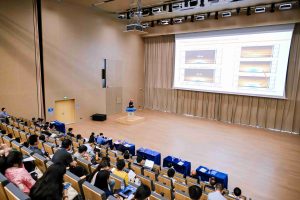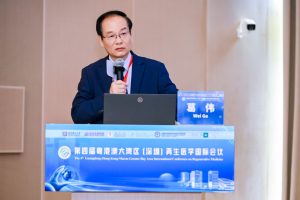The 4th Guangdong-Hong Kong-Macau Greater Bay Area International Conference on Regenerative Medicine, jointly organised by the Faculty of Health Sciences (FHS) of the University of Macau (UM) and Shenzhen University of Advanced Technology (SUAT), took place on 17 and 18 May at SUAT. The conference brought together about 100 renowned scholars, clinical medicine experts, industry professionals, researchers, and students from mainland China, Hong Kong, Macao, the US, South Korea, Japan, and Singapore. Attendees engaged in in-depth discussions on the latest developments in regenerative medicine and its clinical applications.
Ge Wei, vice rector of UM, said in his speech that the Guangdong-Hong Kong-Macao Greater Bay Area is a key region for the development of medical science and technology in China. UM is committed to cultivating outstanding talent in biomedical research and regenerative medicine, providing the driving force for sustainable development of the biomedical industry in the Greater Bay Area. He added that the conference would not only deepen academic exchanges and cooperation between UM and SUAT, but also provide a valuable opportunity for student and faculty from both universities to exchange ideas.
Zhao Wei, registrar of SUAT, said in his speech that the rapid increase in ageing populations and chronic diseases worldwide has generated an unprecedented demand for advanced medical solutions. He noted that, when traditional treatments fail, regenerative medicine can deliver breakthrough solutions for repairing or replacing damaged tissues and organs. Therefore, the Greater Bay Area is developing a top-tier innovation ecosystem, driven by urgent clinical needs and cutting-edge research capabilities. He added that the conference would provide a platform for the exchange of innovative research ideas, as well as learning and collaboration opportunities for students and young scientists.
The conference featured four keynote lectures and 22 academic presentations. During the keynote session, Deng Chuxia, dean of UM FHS, provided an overview of the latest challenges, strategies, and advancements in cancer treatment. He also presented his recent discovery of a novel mechanism through which tumour cells develop broad drug resistance via protein damage response (PDR). Xu Fuqiang, professor at the Shenzhen Institute of Advanced Technology (SIAT) of the Chinese Academy of Sciences, provided an update on the latest research and applications of viral vectors developed in his laboratory. Lian Qizhou, professor in the Faculty of Synthetic Biology at SUAT, shared his ten-year research journey, which has taken him from developing disease models for inherited lipid storage diseases to the clinical application of a cell and gene therapy (CGT). Xu Huji, professor at the Second Affiliated Hospital of the Naval Medical University, presented his pioneering research on the use of allogeneic CAR-T cells to treat autoimmune diseases.
The organising committee of the conference was co-chaired by Xu Renhe, associate dean of UM FHS; Lian Qizhou, professor at SUAT; and Li Gang, professor at SIAT. Ten UM professors participated in the conference, four of whom delivered presentations and five served as moderators. This year’s conference focused on four key areas: stem cell technologies, AI applications in medicine, advances in synthetic biology, and CAR-T cell therapies. In addition, the conference included Young Scientists’ Presentations to facilitate academic exchange and present research projects by young scientists. Eight poster presenters received awards for their outstanding work.
| Source: Faculty of Health Sciences | |
| Media Contact Information: | |
| Communications Office, University of Macau | |
| Albee Lei | Tel: (853) 8822 8004 |
| Bell Leong | Tel: (853) 8822 8009 |
| Email: | prs.media@um.edu.mo |



